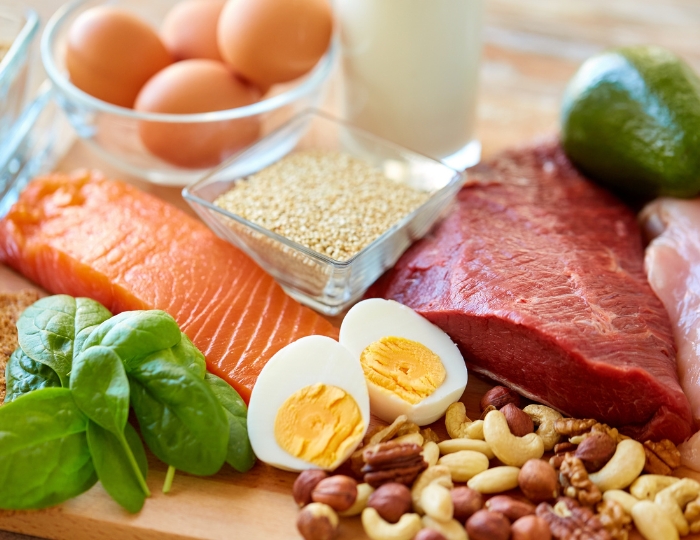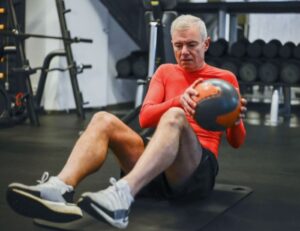We all know that exercise is crucial for maintaining a healthy lifestyle, but what happens after the workout is just as important. While you might feel the urge to collapse on the couch post-workout, prioritizing proper recovery is essential for maximizing the benefits of your efforts. And in the realm of recovery, protein plays a starring role.
This blog post will delve into why protein is your ultimate workout buddy for recovery, exploring its various functions and providing guidance on how to optimize your protein intake for optimal results.
The Role of Protein in Muscle Repair and Growth
When you engage in exercise, particularly strength training, you create microscopic tears in your muscle fibers. [*1] This might sound alarming, but it’s a natural part of the muscle-building process. Protein steps in to save the day by providing the essential amino acids needed to repair these micro-tears and build stronger, larger muscle fibers. [*2] This process, known as muscle protein synthesis, is crucial for muscle growth, adaptation, and overall recovery.
Reducing Muscle Soreness and Fatigue
That post-workout soreness you feel, known as delayed onset muscle soreness (DOMS), is a common result of those micro-tears in your muscles. While protein can’t entirely eliminate DOMS, studies suggest that adequate protein intake can help reduce muscle soreness and promote faster recovery. [*3] By providing the building blocks for muscle repair, protein helps to alleviate inflammation and discomfort, allowing you to get back to your workouts feeling refreshed.
Replenishing Energy Stores
Exercise depletes your body’s energy stores, particularly glycogen, which is the stored form of carbohydrates. Protein can assist in replenishing these energy stores by contributing to the process of gluconeogenesis, where the body converts amino acids into glucose for energy. [*4] This can help combat fatigue and improve your overall energy levels post-workout.
Supporting Immune Function
Intense exercise can temporarily suppress your immune system, making you more susceptible to illness. [*5] Protein plays a crucial role in supporting immune function by providing the building blocks for antibodies and immune cells. [*6] Consuming adequate protein after your workout can help bolster your immune system and reduce your risk of getting sick.
How to Optimize Your Protein Intake
To maximize the recovery benefits of protein, consider these recommendations:
- Timing: Aim to consume protein within 30-60 minutes after your workout, as this is when your muscles are most receptive to absorbing amino acids. [*7]
- Amount: A general guideline is to consume 20-40 grams of protein post-workout, but individual needs may vary depending on factors like your body weight, exercise intensity, and overall dietary intake. [*8]
- Sources: Choose high-quality protein sources such as lean meats, poultry, fish, eggs, dairy, beans, lentils, or protein supplements like whey protein.
Conclusion
Protein is an indispensable nutrient for workout recovery, playing a vital role in muscle repair, soreness reduction, energy replenishment, and immune support. By prioritizing protein intake as part of your post-workout routine, you can optimize your body’s ability to recover, adapt, and thrive. So, make protein your workout buddy and reap the rewards of a well-fueled recovery.
SOURCES:
[*1] Clarkson, P. M., & Hubal, M. J. (2002). Exercise-induced muscle damage in humans. American journal of physical medicine & rehabilitation, 81(11), S52-S69.
[*2] Phillips, S. M. (2014). A brief review of critical processes in exercise-induced muscular hypertrophy. Sports medicine, 44(1), 71-77.
[*3] Pasiakos, S. M., McLellan, T. M., & Lieberman, H. R. (2015). The effects of protein supplements on muscle mass, strength, and aerobic and anaerobic power in healthy adults: a systematic review. Sports medicine, 45(1), 111-131.
[*4] Newsholme, E. A., & Leech, A. R. (1983). Biochemistry for the medical sciences. John Wiley & Sons.
[*5] Nieman, D. C. (1997). Exercise immunology: practical applications. International journal of sports medicine, 18(S1), S91-S100.
[*6] Calder, P. C. (2006). Branched-chain amino acids and immunity. The Journal of nutrition, 136(1), 288S-293S.
[*7] Aragon, A. A., & Schoenfeld, B. J. (2013). Nutrient timing revisited: is there a post-exercise anabolic window?. Journal of the International Society of Sports Nutrition, 10(1), 5.
[*8] Morton, R. W., Murphy, K. T., McKellar, S. R., Schoenfeld, B. J., Henselmans, M., Helms, E., … & Phillips, S. M. (2018). A systematic review, meta-analysis and meta-regression of the effect of protein supplementation on resistance training-induced gains in muscle mass and strength in healthy adults. British journal of sports medicine, 52(6), 376-384.











